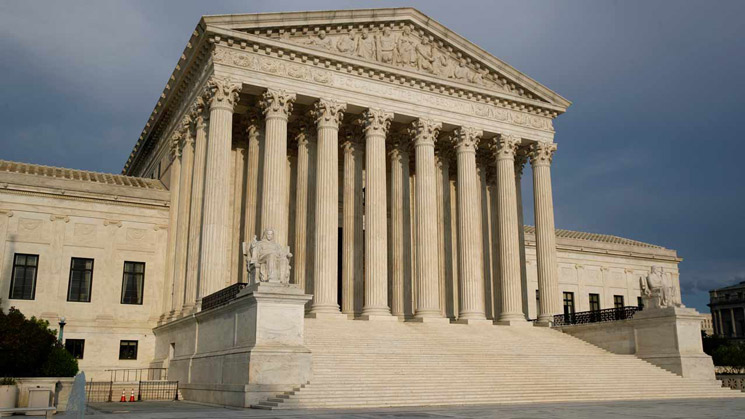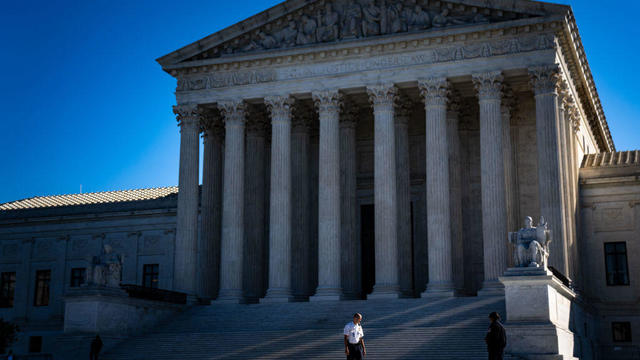Supreme Court Upholds Ban On Gun Ownership For Those Under Restraining Orders For Domestic Violence
The Supreme Court on Friday upheld a federal law that prohibits people who are subject to domestic violence restraining orders from having firearms, ruling that the measure does not violate the Second Amendment.Friday, June 21st 2024, 12:05 pm
TULSA, Okla. -
The Supreme Court on Friday upheld a federal law that prohibits people who are subject to domestic violence restraining orders from having firearms, ruling that the measure does not violate the Second Amendment.
The court ruled 8-1 that a person who has been found by a court to pose a credible threat to the physical safety of another may be temporarily disarmed consistent with the Second Amendment. Chief Justice John Roberts wrote the majority opinion. Justice Clarence Thomas was the lone dissenter, though five of the justices issued concurring opinions.
The high court's decision reversed a ruling from the U.S. Court of Appeals for the 5th Circuit, which struck down the gun possession ban for alleged domestic abusers.
"When a restraining order contains a finding that an individual poses a credible threat to the physical safety of an intimate partner, that individual may — consistent with the Second Amendment — be banned from possessing firearms while the order is in effect. Since the founding, our Nation's firearm laws have included provisions preventing individuals who threaten physical harm to others from misusing firearms," Roberts wrote. "As applied to the facts of this case, [the law] fits comfortably within this tradition."
The ruling was cheered by President Biden and gun violence prevention groups, which said the majority of the court has recognized that commonsense gun laws are allowed under the Second Amendment.
"No one who has been abused should have to worry about their abuser getting a gun," Mr. Biden said in a statement. "As a result of today's ruling, survivors of domestic violence and their families will still be able to count on critical protections, just as they have for the past three decades."
Esther Sanchez-Gomez, litigation director at Giffords Law Center, said that while the justices prioritized the safety of domestic violence survivors, the ruling maintains the status quo.
"Today's ruling will save lives, but too many women die at the intersection of domestic violence and firearms. We still have a lot of work to do," she said in a statement.
U.S. v. Rahimi
The case, known as U.S. v. Rahimi, was the first involving the Second Amendment heard by the court following its landmark June 2022 ruling that expanded gun rights and set out a new legal framework for determining when firearms restrictions are constitutional. The test requires the government to show that a challenged gun law fits with the nation's history and tradition of firearms regulation. It can satisfy that standard by putting forth laws that are analogous to the modern-day measure under scrutiny.
In the wake of that ruling nearly two years ago, a number of long-standing gun laws have been challenged in federal courts and, in some instances, invalidated. But confusion and division among lower courts over how to apply the Supreme Court's so-called history-and-tradition test led to calls for the justices to clarify it.
The legal battle involving the protections for victims of domestic violence presented the high court with the first opportunity to address that fallout, and Roberts wrote that some lower courts have "misunderstood" the methodology of its recent Second Amendment cases, which he said were "not meant to suggest a law trapped in amber."
"The law must comport with the principles underlying the Second Amendment," the chief justice wrote of the historical analogs required under the Supreme Court's framework, "but it need not be a 'dead ringer' or a 'historical twin.'"
The court's majority found that the nation's firearms laws have long disarmed people who threaten physical harm to others. He said that as applied to the facts of the case, the prohibition for alleged domestic abusers is in line with that tradition.
The case involves a law enacted by Congress 30 years ago, which prohibits people under domestic violence restraining orders from having guns. A Texas man, Zackey Rahimi, was subject to such an order granted to a former girlfriend when he threatened another woman with a firearm and fired guns in public on five different occasions in December 2020 and January 2021.
After those incidents, police executing a search warrant found two guns at Rahimi's residence. He was indicted under the 1994 law and pleaded guilty, but challenged the constitutionality of the firearms prohibition as outside constitutional bounds.
The 5th Circuit tossed out Rahimi's conviction and invalidated the gun law after applying the Supreme Court's history-and-tradition test. The appeals court said the historical analogs put forth by prosecutors "fall short," and the prohibition for people under domestic violence restraining orders "falls outside the class of firearm regulations countenanced by the Second Amendment."
The justices heard arguments in the case in November. Conservative members of the court suggested that people found to be a danger to society could be disarmed and largely agreed that Rahimi, in particular, should not have access to weapons.
Referencing laws dating back to the mid and late 1700s, the Supreme Court's majority found that "when an individual poses a clear threat of physical violence to another, the threatening individual may be disarmed."
But Thomas, in dissent, refuted the majority's conclusion and said "not a single historical regulation justifies" the ban for people under domestic violence restraining orders, which he concluded violates the Second Amendment.
"The court and government do not point to a single historical law revoking a citizen's Second Amendment right based on possible interpersonal violence," wrote Thomas, who authored the majority opinion in the 2022 case. "The government has not borne its burden to prove that [the prohibition] is consistent with the Second Amendment's text and historical understanding."
He warned the decision in Rahimi's case threatens the Second Amendment rights of broader subsets of society.
The impacts of the decision are likely to factor into challenges involving other gun laws that are moving through the lower courts or awaiting action from the justices. The ruling provides guidance as to what founding-era firearms regulations may be put forth by the government to justify a modern-day restriction.
"As we said in Bruen, a 'historical twin' is not required," Roberts wrote for the court, referencing its June 2022 decision in the case New York State Rifle and Pistol Association v. Bruen.
One of those pending cases involves the constitutionality of a law disarming people convicted of nonviolent felonies, and a second concerns a law prohibiting a person who is an unlawful drug user from having guns. Hunter Biden, President Biden's son, was found guilty by a Delaware jury of violating that law and two others related to his purchase and possession of a revolver in October 2018, while he was addicted to crack cocaine. The president's son can pursue an appeal of his conviction that challenges the constitutionality of the federal prohibition on drug users.
The National Rifle Association said that the court's opinion is a narrow one and doesn't offer an endorsement of laws that are being challenged in federal courts across the country.
"This decision holds only that an individual who poses a clear threat of violence may be temporarily disarmed after a judicial finding of dangerousness," Randy Kozuch, executive director of the NRA Institute for Legislative Action, said in a statement.
More Like This
June 21st, 2024
January 14th, 2025
January 14th, 2025
January 14th, 2025
Top Headlines
January 14th, 2025
January 14th, 2025
January 14th, 2025
January 14th, 2025









